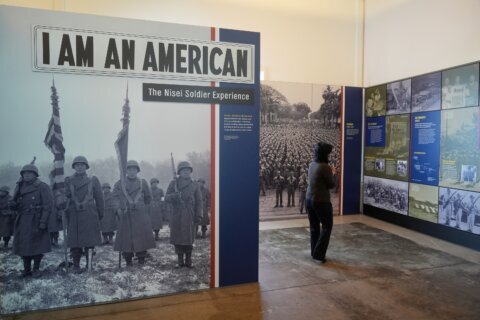WASHINGTON — Eight years ago, newly elected President Barack Obama told the nation, “If there is anyone out there who still doubts that America is a place where all things are possible, who still wonders if the dream of our founders is alive in our time, who still questions the power of our democracy, tonight is your answer.”
A few months later, a house that was built using slave labor became home to the country’s first black president. And while that might have signaled the U.S. was inching into a post-racial era, journalist April Ryan says in many ways, the country is in a backslide.
“I believe today [Jan. 9] we’re seeing glimpses of the past again — 50 years ago,” said Ryan, a White House correspondent for American Urban Radio Networks who has covered three presidents, including Obama.
“We’re seeing glimpses of the past again in so many ways. Hate crimes are on the rise, that’s proven from stats that have been out there since Election Night. So many different things — and just the words that are used against the first black president. We are not post-racial. Jan. 20, the new marker in this country will be post-Obama.”
Race is a topic Ryan has studied for years. In 2015, her book, “The Presidency in Black and White,” explored the impact of the last three administrations on race relations. More recently, Ryan moved the conversation out of the White House and into everyone’s house. For her latest book, “At Mama’s Knee,” she interviewed iconic figures to find out what their mothers told them about race.
Her decision to shine the spotlight on mothers is simple. For starters, she is a mother to two girls. Living in Baltimore, race is something she explains often — especially in the wake of the Freddy Gray riots and other racially charged events in the news.
“I had to tell my little 9-year-old, who was then a couple of years younger, that she could not play with her toy gun outside because people may misconstrue it as something else. And I had to tell her about what happened with Tamir Rice,” Ryan said.
“As a mother and as someone who deals with matters of race at the highest office in the land, I just thought I had to really speak out and get people to talk on this because over the last couple of years we have been dealing with this issue, and who better to lead the conversation than the people who nurture us and teach us and give us our first lessons — the mothers.”
For the book, Ryan spoke with President Jimmy Carter, Hillary Clinton, Sen. Cory Booker and Obama, who doesn’t normally open up about his mother.
“He gave us insight as to what his mother was telling him on matters of race and how she guided him into the understanding of the black community — something that he was going to be part of. … She wanted him to see the bad, the good and the possibility of hope,” Ryan said.
Harry Belafonte told Ryan that his mother said never to sit idly by while injustice happens. Congressman John Lewis, a Civil Rights icon, said his mother’s faith is what fueled his belief that he could march and make change in the U.S.
A common thread Ryan found in all of the conversations is that mothers help to shape the way children view matters of race and that they have the power to help future generations be more inclusive and understanding.
“Mothers are our first teachers. Mothers are the ones who give us our first lessons,” Ryan said.
“They’re not talking about legislation; they were talking about guiding in everyday footsteps and everyday means to make things work.”







